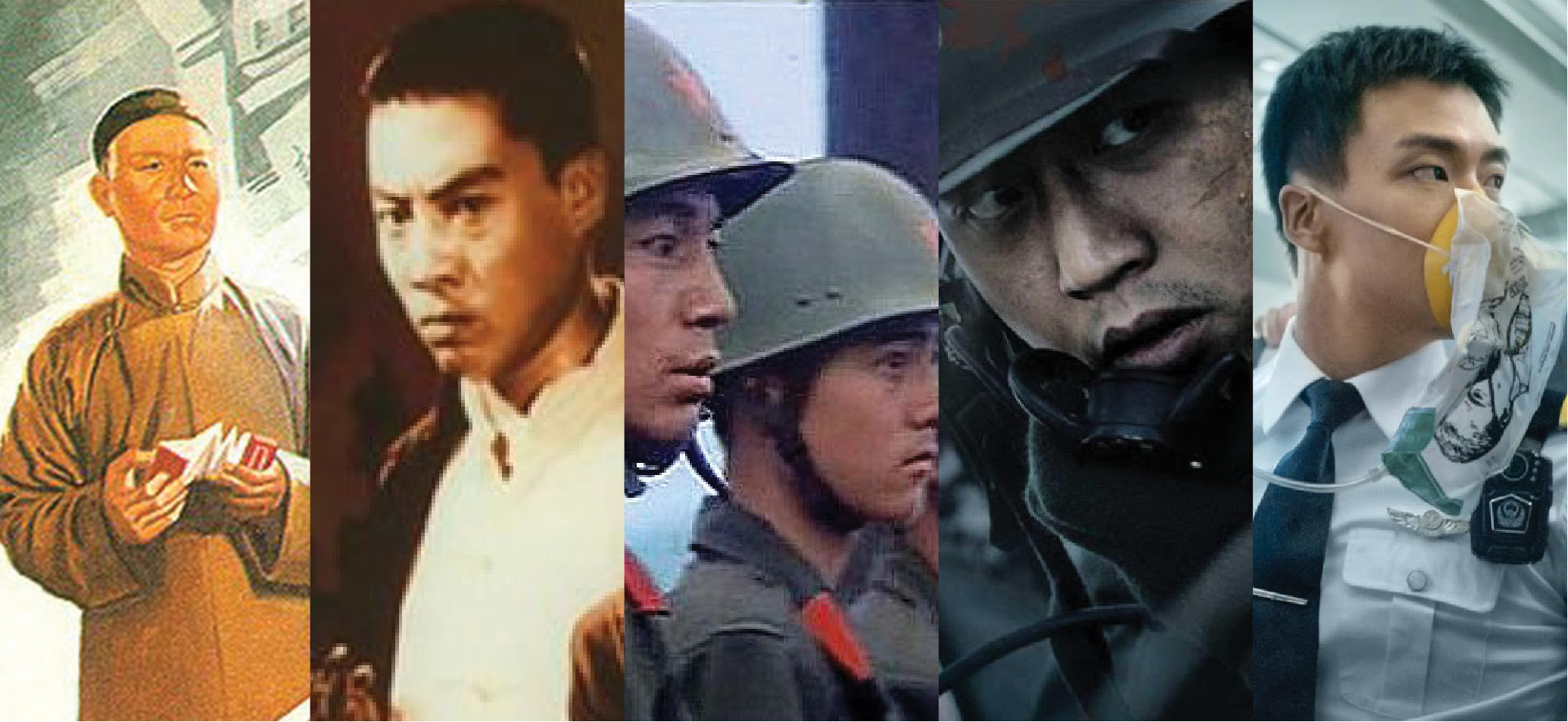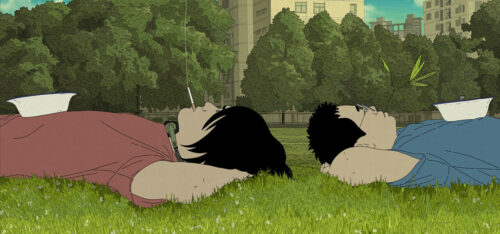5 ‘patriotic’ Chinese movies that we like
Golden Week is traditionally a popular time for movies in China, particularly films with a patriotic bent. Here are five that we recommend, including by directors Chen Kaige and Feng Xiaogang.

Along with Chinese New Year, the holiday week that begins with National Day — October 1, the founding of the People’s Republic of China — is one of the biggest moviegoing seasons in China. Patriotic films have marked anniversaries of the PRC’s founding for decades, celebrating modern Chinese culture and history. (And the Chinese Communist Party.) Outside of the season in recent years, we’ve also seen flashy, jingoistic blockbusters like Wolf Warrior 2 (战狼2 zhàn láng) dominate the domestic box office and garner international attention.
While Wolf Warrior 2 might hit viewers over the face with its message, not every Chinese film on the theme is so shamelessly nationalistic. In commemoration of National Day, here are five films that explore Chinese patriotism from the more critical, thoughtful side of national pride, to its proudest (and simplest) manifestations.

1. The Lin Family Shop (1959)
The Communist Party recognized the power of film early on, and for the 10th anniversary of the PRC, decided that filmmaking could be a useful way to show off the new China. At home, studio heads met with officials from the Film Bureau in November 1958, exchanging ideas for movies for the next year. Abroad, much to the dissatisfaction of the United States, the anniversary was promoted by hosting Chinese films around the world, including screenings in Iraq and Sri Lanka.
Chinese filmmakers were eager to help. They channeled their enthusiasm into patriotic fare, and at the request of the government, also made stories about the country’s ethnic minorities to highlight national unity. Some of these movies took the Second Sino-Japanese War as their backdrop. Song of Youth (青春之歌 qīng chūn zhī gē) told the story of a depressed woman’s turn to Communist revolution, while Nie Er (聂耳 niè ěr) was a biography about the life of the 23-year-old musician who wrote the PRC’s national anthem. Another drama, a monumental epic, colored the Qing Dynasty hero Lín Zéxú 林则徐 into a Communist idealist.
Director Shuǐ Huá’s 水华 The Lin Family Shop (林家铺子 lín jiā pùzi) is the most impressive of these 10th-anniversary films, although certainly not a feel-good story. After the Japanese invasion of Manchuria, Chinese patriots launched a campaign to boycott Japanese goods. The boycott threatens the livelihood of Mr. Lin, a shopkeeper who resorts to bribery so he can sell Japanese products under Chinese names. Lin is desperate because he’s in debt, but his unscrupulous behavior ends up hurting his customers more than himself. Although he’s a traitor — his actions even culminate in a Guomindang-led massacre — Lin is a person pushed to extremes by capitalism. The Lin Family Shop reserves a surprising depth and pathos for a very unpatriotic man, as much a victim as the people he exploits.

2. Tunnel War (1965)
Since the end of the Second-Sino Japanese War, there’s been a countless number of movies about the conflict. This devastating part of Chinese history, with its stories of heroism, tragedy, and resilience, has always been a sure way to stir up national fervor. For that reason, this genre of war film is also a perfect vehicle for Chinese propaganda. Traditionally, these movies have starred strong, confident Chinese fighters against barbaric and cartoonish Japanese. The good guys are never afraid or doubtful, and they’re always on the right side of history.
Tunnel War (地道战 dìdào zhàn) is a classic example of this kind of self-assured, old-fashioned war movie. It romanticizes the guerrilla warfare the Communists famously depended on, depicting a village militia fighting the Japanese army through a network of tunnels. Little Gao village is outnumbered and outgunned, but its leaders Chunbao and Laozhong are determined to drive out the Japanese invaders. Inspired by Máo Zédōng 毛泽东 and his writings on guerilla fighting, the villagers convert the tunnels where they hide into secret attack centers.
Through cleverness and strategy, the villagers are able to turn the table, allowing the militia to close in and surround the sinister General Yamada and his forces. The villagers are unquestionably brave and optimistic — a trope of the genre, along with daring sacrifices and a few rousing musical numbers. But with its cramped, claustrophobic location, and emphasis on tactical skirmishes rather than epic battles, Tunnel War is a lot more interesting than the usual War of Resistance movie. It was very popular on its release, and even during the Cultural Revolution, saw screenings when most other films were banned during the time.

3. The Big Parade (1986)
Produced for the 70th anniversary of the PRC, last year’s My People, My Country (我和我的祖国 wǒ hé wǒ de zǔguó) was a star-studded anthology made up of seven vignettes from the history of Communist China. Chén Kǎigē 陈凯歌, director of Farewell, My Concubine (霸王别姬 bàwáng bié jī), contributed an episode about homeless brothers who are fascinated by the Shenzhou 11 space mission. While praised in China, critics elsewhere were less impressed, labeling it as propaganda. A high school in Canada was even criticized on social media for showing the trailer to Mandarin students and giving an assignment about it.
This was not the first time Chen got into trouble with a National Day-themed film, although he was earlier lambasted by the other side. Two years after his groundbreaking debut Yellow Earth (1984), Chen followed up with The Big Parade (大阅兵 dà yuè bīng), a movie about PLA soldiers who train to lead an extravagant National Day parade. The men are bossed around by a strict drill sergeant, and as they march, practice, and suffer in the hot sun, they give up their individuality and lose themselves in the collective. The movie concludes with a spectacular parade in Tiananmen Square, as hordes of soldiers march as one, contrasted by a final image of a lone soldier’s silhouette in the sun.
The Big Parade was ambiguous and impressionistic, confusing Western critics and Chinese censors alike. (The New York Times mistakenly called it a “Recruiting Poster for Collective Action.”) In the guise of a nationalist spectacle, Chen was actually criticizing the sort of gung-ho patriotism that he depicted, as individuals were thrown aside for the greater good of the group. This meaning apparently wasn’t lost on the Chinese government. Despite slapping on the parade scene at the end of the film, they still ended up pulling it from the 1987 Cannes Film Festival.

4. Assembly (2007)
Compared to Tunnel War and its ilk, modern movies about the Second Sino-Japanese War are grittier, with a greater attention to violence and realism. In the past two decades, we’ve even seen war movies that use an anti-war message to subvert or mock the usual high-minded cliches. The dark comedy Devils on the Doorstep (鬼子来了 guǐzi láile) (2000) was condemned by some for its misanthropic take on the war, depicting both sides as brutal and foolish. The haunting City of Life and Death (2009), about the Nanjing Massacre, raised eyebrows not only for its graphic violence, but also its depiction of a sympathetic Japanese soldier.
While not as blunt or disturbing as these two anti-war films of the aughts, Féng Xiǎogāng’s 冯小刚 Assembly (集结号 jíjié hào) is a more accessible consideration on the dark side of war. During a battle in the Chinese Civil War, PLA Captain Gu Zidi is left as the only survivor of his unit. After the fight, Gu is smeared as a deserter, and the sacrifice of his men is forgotten. In the second half of the story, Gu distinguishes himself in the Korean War. He then attempts to find the remains of his fallen comrades, whose memory he wants to see remembered and honored.
In an interview with Screen Daily, Feng stressed the difference between Assembly and traditional Chinese war movies. “In previous Chinese war films, everyone loves to go to war and they are never afraid. This is against human nature,” he remarked. While classics like Tunnel War are simplistic in their celebration and glorification of victory, Assembly is more nuanced, pointing to the human cost of these great triumphs.

5. The Captain (2019)
2019 was a huge year for patriotic blockbusters. My People, My Country was the fourth highest-grossing Chinese film of the year, and its upcoming comedy sequel, My People, My Homeland (我和我的家 wǒ hé wǒ de jiā), is sure to hit gold again when it opens on October 1. Two other notable releases of the last year, The Climbers (攀登者 pāndēng zhě) and The Captain (中国机长 zhōngguó jī zhǎng), were also true stories, with a flag-waving bent on heroic ordinary people. The former chronicled Chinese attempts to climb Mount Everest, while the latter was about a Sichuan Airlines flight that nearly ended in disaster.
While reviews are decent on Douban, The Climbers has been panned outside of China, with a 33% approval rating on Rotten Tomatoes. The Captain, at 75%, I would have to agree is the better movie. Its eponymous hero is Liu Changjian, a former air force pilot who now works for Sichuan Airlines. While piloting a flight from Chongqing to Tibet, on his daughter’s birthday no less, a part of Liu’s cockpit’s windshield breaks. Flying at 30,000 feet in the air, Liu tries to steer the plane to safety as he and his crew brave low altitudes, thunderstorms, and increasingly panicky passengers.
Although it suffers from some poorly developed characters, and laughably bad dialogue at times, The Captain is a fantastic thriller. We all know the ending here, but director Andrew Lau (刘伟强 Liú Wěiqiáng) manages to keep the movie gripping with a matter-of-fact style that emphasizes the technical side of things. While not a masterpiece by any means, The Captain is effective for what it sets out to do: saluting the story of an amazing real-life hero and his crew.
Where to watch: Amazon, via streaming with English subtitles.






